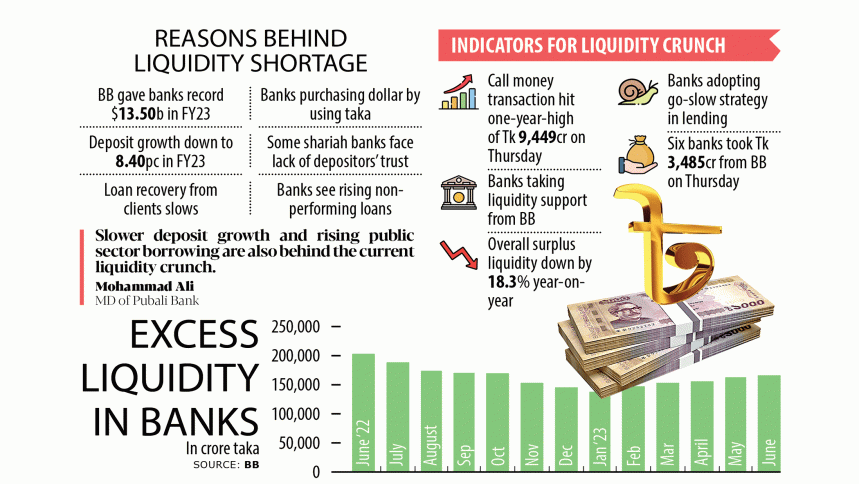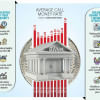Most banks in tight spot amid liquidity crunch

A majority of banks in Bangladesh are facing difficulties in running their day-to-day banking activities owing to a tightening liquidity caused by the dragging foreign currency crisis, slower deposit growth and lacklustre loan recovery.
This has forced lenders to turn to the call money market, a short-term money market that allows large financial institutions to borrow and lend, to secure funds in order to meet their payment obligations.
On Thursday, the transaction on the overnight interbank call money market stood at Tk 9,449 crore, the highest since August 11 last year when it amounted to Tk 9,706 crore.
Multiple factors such as slower deposit growth, a weak pace of loan recovery and the purchase of dollars by banks from the Bangladesh Bank to clear import bills have brought about the current situation.
Deposit growth decelerated to 8.40 percent in the last fiscal year of 2022-23 from 8.90 percent the previous year.
Classified loans, which erode a bank's lending capacity, have also soared.
Non-performing loans (NPLs) totalled Tk 131,620 crore in March, marking a 16.02 percent increase year-on-year, BB data showed. The volume was 8.80 percent of the total credits disbursed in the banking sector.
Bankers say a portion of letters of credit has already turned into forced loans owing to borrowers' failure to pay back on time.
Against the backdrop, the call money rate, the interest rate on overnight loans – surged to as high as 7.75 percent on Thursday.
According to bankers, the call money market has been witnessing huge pressure since the middle of 2022. So, a growing number of banks, including shariah-based lenders, are taking liquidity support from the central bank despite the hike in the policy rate.
Seven banks took Tk 4,925 crore under the seven-day repurchase agreement (repo) and the one-day liquidity support facility of the BB on August 6 this year. A day later, eight banks borrowed Tk 3,339 crore.
Four banks took Tk 3,402 crore on August 8 and six banks borrowed Tk 3,485 crore on August 9.
In July, the BB increased the repo rate by 50 basis points to 6.50 percent.
A senior official of the central bank said the volatility in the foreign exchange market may be the main reason for the tight liquidity situation in the banking sector.
Higher import bills against moderate export and remittance earnings have caused the slide in the foreign currency reserves in Bangladesh, sending the US dollar rate to a record high amid the shortage of American greenback.
The BB sold $13.50 billion from its reserves among banks in exchange for the taka, deepening the liquidity crunch.
In June, the surplus liquidity in the banking sector stood at Tk 1,66,200 crore, down from Tk 2,03,435 crore a year ago, BB data showed.
Of the surplus liquidity, Tk 63,600 crore were with state-run banks, Tk 68,300 crore were held by private commercial banks, and the rest Tk 34,300 crore belonged to foreign banks.
A lion's share of the surplus liquidity has been invested in treasury bonds and bills.
The liquidity situation varies from bank to bank, with some sitting on excess funds while others are facing liquidity shortages.
At least a dozen banks, including six shariah-based banks, are now facing a severe liquidity crisis. And they have failed to maintain the minimum cash with the central bank, the central bank said in a report.
In Bangladesh, shariah-compliant banks are particularly bearing the brunt of the liquidity crisis after loan irregularities made headlines as it prompted some borrowers to withdraw funds, industry insiders said.
Pubali Bank Managing Director Mohammad Ali blamed the slower deposit growth amid the persisting cost of living crisis and the widening public sector credit for the current liquidity crunch.
"Small and medium-scale deposits have been withdrawn in recent months as savers continue to struggle to meet their living expenses."
Average inflation stood at 9.69 percent in July, slightly lower than the 11-year high of 9.94 percent in May.
Pubali Bank faces no liquidity shortage. Rather, its deposits increased by Tk 6,000 crore in the last six months, according to Ali.
The CEO points out that public sector borrowing increased to a large extent last year, worsening the liquidity situation at banks.
Jamuna Bank Managing Director Mirza Elias Uddin Ahmed says although a good number of banks are in a liquidity crisis, the liquidity situation of the overall banking sector is not that bad.
He, however, acknowledges that loan recovery is not in good shape at all because borrowers are not interested in paying back using the current economic slowdown as an excuse.
"This has tightened the liquidity situation."
Dhaka Bank Managing Director Emranul Huq says the liquidity situation is continuing to improve except for some shariah-based banks since the private sector credit demand is yet to pick up and import payments have slowed in recent months.
He, however, warned that the liquidity situation would become tighter once credit demand rebounds.
Private sector credit growth stood at 10.57 percent in FY23, way down from 13.66 percent a year prior.
"Banks have slowed down lending due to the current economic uncertainty," Huq added.

 For all latest news, follow The Daily Star's Google News channel.
For all latest news, follow The Daily Star's Google News channel. 







Comments